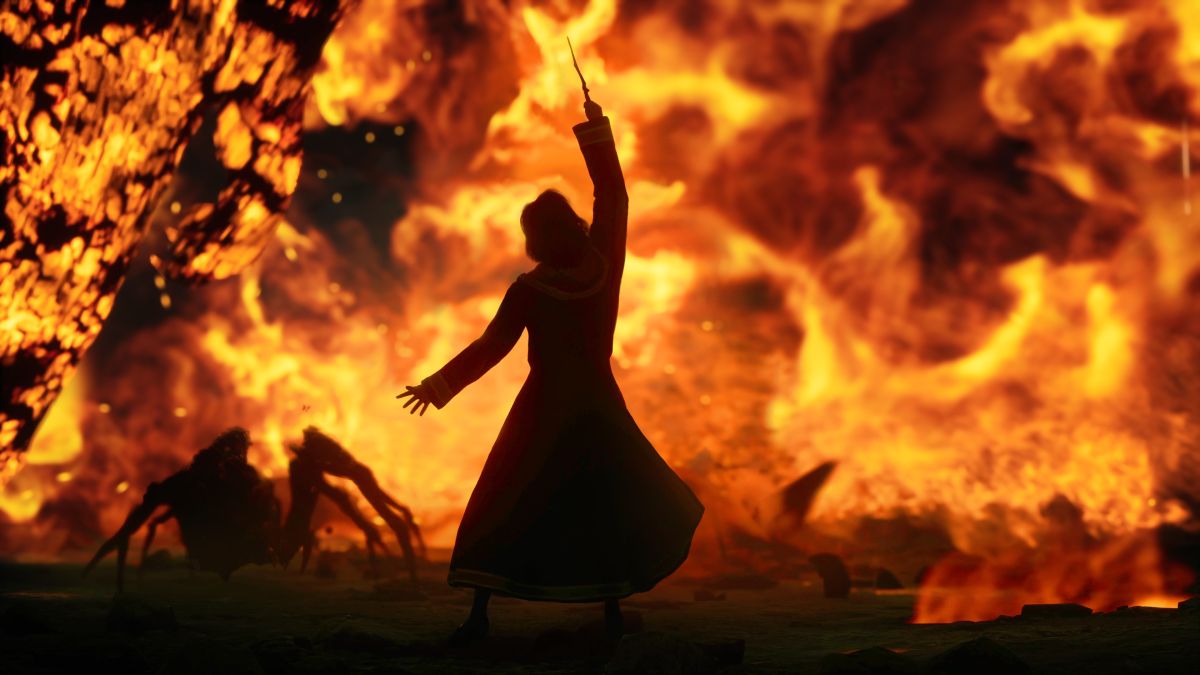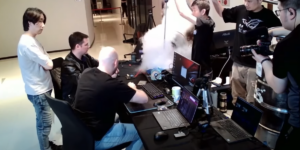
It’s a recurring element of the Harry Potter books that student witches and wizards are constantly judged by their teachers, handed demerits that punish everyone in their House (“50 points from Gryffindor!”), and warned away from forbidden magic like the Unforgivable Curses. Which is why it came as a surprise that, ahead of the launch of Hogwarts Legacy, Avalanche Software explained players wouldn’t be judged for casting evil spells.
“It was important for us to give players who sought out to be a Dark Witch or Wizard an opportunity to do so,” lead designer Kelly Murphy said at the time. “This is the ultimate embodiment of role-playing: allowing the player to be evil. Additionally, this was important because it comes from a place of non-judgment by the game creators. If you want to be evil, be evil.”
As YouTuber GrandTheftDiamonds (opens in new tab) discovered during a datamine of Hogwarts Legacy SQL files, it seems Avalanche wasn’t always convinced that was the right way to go. As their video (opens in new tab) documents, the PhoenixGameData SQL file contains references to certain actions having a cost in House Points—including the use of Unforgivable Curses like Avada Kedavra.
Appropriately, the Killing Curse is assigned the maximum penalty listed: -100 points. Casting Imperius to control someone’s mind would have cost -50 points, and actions like Extortion and Bullying would have lost you points as well (-50 and -25 respectively). Few things were assigned positive points, but among them were studying in class (10 points), and participation while attending a club (5 points). Combined with some minor penalties for sleeping in class, playing the clown, or otherwise misbehaving when you ought to be learning, that suggests another feature was cut from Hogwarts Legacy—a system for choosing how you behave in the classroom that might have made it feel a bit more like Bully with broomsticks.
Other data in Hogwarts Legacy’s files describe punishments beyond losing 100 points for Hufflepuff when you commit an actual murder. Tables like CrimeSceneInvestigations and CallAF, which GrandTheftDiamonds sensibly presumes stood for “Call Authority Figure”, make it seem like Avalanche was considering a chance of players being caught and punished for misbehavior. Each crime is assigned a severity that affects how many investigators will be called in, how long they’ll investigate, and how much area they’ll cover, and the CrimeEnforcementMatrix table includes actions like “CrimeResponseScold” and “TabooGameOver” as results of being caught.
Another system that seems to have been considered during development was a reputation score, with the MiscDataDynamic table including entries that list ranks going from Hate, up to Dislike, Indifferent, Familiar, Cordial, Friendly, and finally Companion. It makes sense that if Hogwarts Legacy kept track of your morality, that could affect how NPCs see you, like with Fallout’s karma system.
Hogwarts Legacy Guides
It’s been suggested by plenty of players that something felt off about the finished game, with our own Morgan Park remarking that there sure is a lot of murdering in Hogwarts Legacy. Implementing systems that would result in actions having consequences might have gone some way to making up for that, but it seems like Avalanche was confident in its decision to nix the idea. “Characters will react visually and audibly to seeing the player cast an Unforgivable, but we don’t have a morality system that punishes them for doing so—this would be too judgemental on the game maker’s part,” lead designer Kelly Murphy said ahead of launch.
Maybe it’s something to be explored further in a sequel. Given that Hogwarts Legacy made over a billion dollars, it’s hard to imagine that a follow-up isn’t in the works.
- SEO Powered Content & PR Distribution. Get Amplified Today.
- PlatoAiStream. Web3 Data Intelligence. Knowledge Amplified. Access Here.
- Minting the Future w Adryenn Ashley. Access Here.
- Buy and Sell Shares in PRE-IPO Companies with PREIPO®. Access Here.
- Source: https://www.pcgamer.com/datamining-shows-hogwarts-legacy-almost-had-a-morality-and-reputation-system
- :is
- $UP
- 10
- 100
- 50
- a
- About
- actions
- actual
- Additionally
- affect
- ahead
- Allowing
- always
- among
- an
- and
- Another
- ARE
- AREA
- AS
- assigned
- At
- attending
- authority
- Avalanche
- away
- BE
- because
- been
- being
- Beyond
- Billion
- Bit
- Books
- bullying
- but
- by
- call
- called
- came
- caught
- certain
- Chance
- characters
- choosing
- class
- club
- Cms
- combined
- comes
- commit
- companion
- confident
- Consequences
- considered
- considering
- constantly
- contains
- control
- Cost
- could
- cover
- creators
- Crime
- curse
- Cut
- Dark
- data
- decision
- describe
- Designer
- Development
- discovered
- do
- documents
- doing
- don
- during
- each
- element
- Ether (ETH)
- everyone
- explained
- Explored
- extortion
- fallout
- familiar
- Feature
- feel
- few
- Figure
- File
- Files
- Finally
- For
- friendly
- from
- further
- game
- Give
- given
- Go
- going
- had
- Hard
- Have
- having
- Hogwarts Legacy
- House
- How
- HTTPS
- idea
- if
- imagine
- implementing
- important
- in
- includes
- Including
- investigate
- Investigators
- isn
- IT
- ITS
- jpg
- judged
- Karma
- kept
- launch
- lead
- learning
- Legacy
- like
- List
- Listed
- ll
- Long
- losing
- lost
- Lot
- made
- magic
- make
- maker
- MAKES
- Making
- many
- maximum
- might
- mind
- minor
- morality
- more
- Morgan
- much
- murder
- New
- of
- off
- on
- opens
- Opportunity
- or
- otherwise
- our
- out
- over
- own
- Park
- part
- participation
- Place
- plato
- Plato Data Intelligence
- PlatoData
- player
- players
- playing
- Plenty
- points
- positive
- ranks
- React
- recurring
- references
- reputation
- respectively
- result
- Results
- right
- Role-Playing
- s
- Said
- score
- seasonal
- see
- seeing
- seem
- seems
- sense
- So
- Software
- some
- Someone
- something
- SQL
- Student
- Studying
- Suggests
- surprise
- system
- Systems
- table
- teachers
- that
- The
- their
- Them
- they
- things
- this
- time
- to
- too
- track
- ultimate
- us
- use
- want
- was
- wasn
- Way..
- we
- WELL
- were
- when
- which
- while
- WHO
- why
- will
- with
- works
- would
- you
- Your
- youtube
- youtuber
- zephyrnet









